Publications
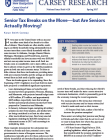
May 9, 2017
Every state in the United States with an income tax offers some kind of tax break to its older citizens. These breaks are often sizable, resulting in an elderly household owing substantially less in income taxes than a non-elderly household with the same income. In Alabama, Georgia, Hawaii, Illinois, Michigan, Mississippi, and Pennsylvania, married elderly households can have incomes well over $…
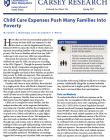
May 2, 2017
UPDATE: This fact sheet was updated on October 24, 2024, to reflect analytics corrections to some estimates. In this fact sheet, we use the Supplemental Poverty Measure (SPM) to assess the extent to which child care expenses are pushing families with young children into poverty.
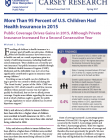
April 25, 2017
Enrolling all children in health insurance is a primary goal of health care advocates. Children who have health insurance have better access to health care and, as a result, experience gains in a variety of well-being measures, including health and school attainment.1 Most children are covered by private insurance,2 but public insurance available through the Children’s Health Insurance Program (…
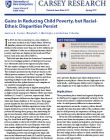
April 18, 2017
In 2015, for the second year in a row, child poverty rates declined in the United States. However, familiar patterns in levels and characteristics of child poverty persist: more than one in five children are poor; children of color are at disproportionate risk for poverty; and rates are highest in the South and West and in rural areas and cities (Table 1). This brief uses data from the American…
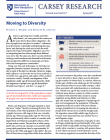
April 4, 2017
America is growing more racially and ethnically diverse,1 yet some parts of the country are far more diverse than others. Migration—the flow of people from one place to another2—influences local diversity by continually redistributing the population3 and altering the racial mix in both the sending and receiving communities. Migration can serve an integrating function when people from different…
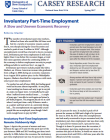
March 28, 2017
The number of involuntary part-time workers, defined as those who would like full time work but for a variety of economic reasons cannot find it, rose sharply during the Great Recession and reached a peak of over 9 million in 2010.1 Although unemployment overall has returned to its pre-recession level, involuntary part-time employment is still much higher than it was before the recession began, a…
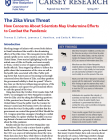
March 21, 2017
Shocking images of infants with severe birth defects in Brazil introduced the world to the devastating effects of the Zika virus. This mosquito-borne illness spread rapidly across Latin America and into the United States. News stories highlighting locally transmitted cases of Zika in Florida, and most recently in Texas, created a sense of urgency among public health officials. They stepped up…
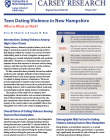
March 14, 2017
Dating Violence Among High School Teens Dating violence, defined as physical abuse (such as hitting) or sexual abuse (such as forcible sexual activity) that happens within the context of a current or former relationship, leads to a host of negative consequences, including poor mental and physical health and academic difficulties.1 Therefore, it is important that researchers examine factors that…
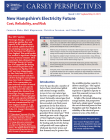
March 7, 2017
May 2017 update PointLogic Energy, a source for natural gas pipeline flow and capacity in the original report, has recently updated its models for calculating natural gas flow in the Tennessee Gas Pipeline in New England. This model update has resulted in significant changes to their previous estimates. Most importantly, data obtained from PointLogic Energy in December 2016 supported the finding…
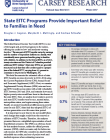
February 28, 2017
The federal Earned Income Tax Credit (EITC) is one of the largest anti-poverty programs in the nation, offering tax credits to low- and moderate-earning families.1 The amount of EITC benefits varies by earnings and the number of dependent children in a family, with considerably more generous benefits going to families with children. In addition to the federal EITC, as of 2015, twenty-six states…
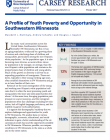
February 14, 2017
Like many rural communities across the United States, Southwestern Minnesota (hereafter SW Minnesota; see Box 1) has an aging population, evidenced by a growing share of seniors and a declining share of children and young adults, particularly among the non-Hispanic white population.1 As the population ages, it is also becoming more diverse, as racial-ethnic minority population is far younger, on…
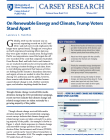
February 2, 2017
Globally, 2016 was the warmest year on record, surpassing records set in 2015 and 2014,1 and each new record emphasizes the longer-term upward trend. Though not every place on Earth experienced warming effects last year, they were quite evident in many areas. Rising South Pacific sea temperatures caused the largest die-off ever recorded of the coral that composes Australia’s Great Barrier Reef,…
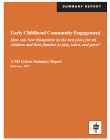
February 1, 2017
In the first few years of a child’s life, hundreds of neural connections form in the brain. When children engage with and receive thoughtful responses from adults, they form strong relationships that bolster healthy growth. Creating conditions (in the home, at school/child care, and in the community) that promote robust brain development and reduce toxic stress early on is likely to be more…
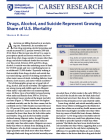
January 31, 2017
Americans are killing themselves at an alarming rate. Nationwide, the mortality rate1, from drug poisoning, alcohol poisoning, and suicide increased by 52 percent between 2000 and 2014. Most of this increase was driven by a surge in prescription opioid and heroin overdoses, but overdoses from other drugs, suicides by means other than drugs, and alcohol-induced deaths also increased over this…
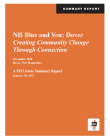
January 18, 2017
Over ninety people from the community squeezed into Flight Coffee for a conversation about community- police relations in Dover. Participants with a range of ages, races, and educational backgrounds were represented at this event. Attendees’ final recommendations and key areas of concern can be used by decision makers to inform next steps, as well as prioritize issues that were identified in a…
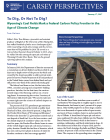
January 17, 2017
Editor’s Note: Tom Haines, a journalist and assistant professor of English at The University of New Hampshire, has walked hundreds of miles across landscapes of fuel while researching a book about energy and the environment that will be published in 2018. He served as a Carsey School Summer Research Scholar in 2015, when he walked 50 miles among the open-pit coal mines of Wyoming’s Powder River…
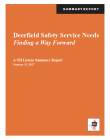
January 13, 2017
Participants at the conversation on the future of safety services for Deerfield expressed a range of perspectives, all of which were recorded by facilitators. Over about two hours, seven small groups―each with a trained facilitator―identified the most important issues. The summary below and the small group notes reveal strong overall themes as well as a rich collection of specific ideas. Included…
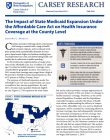
December 6, 2016
Counties and states with large shares of uninsured risk having to contend with a range of health and economic impacts, such as reduced workplace productivity, unsustainable demands on emergency departments, higher tax burdens resulting from uncompensated care costs, and deteriorating health care quality due to reductions in public spending.1
In 2013, before the implementation of major…
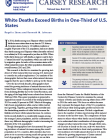
November 29, 2016
In 2014, deaths among non-Hispanic whites exceeded births in more states than at any time in U.S. history. Seventeen states, home to 121 million residents or roughly 38 percent of the U.S. population, had more deaths than births among non-Hispanic whites (hereafter referred to as whites) in 2014, compared to just four in 2004. When births fail to keep pace with deaths, a region is said to have a…
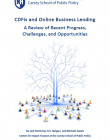
November 10, 2016
In March 2015, the Center for Impact Finance at the Carsey School of Public Policy at the University of New Hampshire convened the 16th Annual Financial Innovations Roundtable at the Federal Reserve Board in Washington, DC.